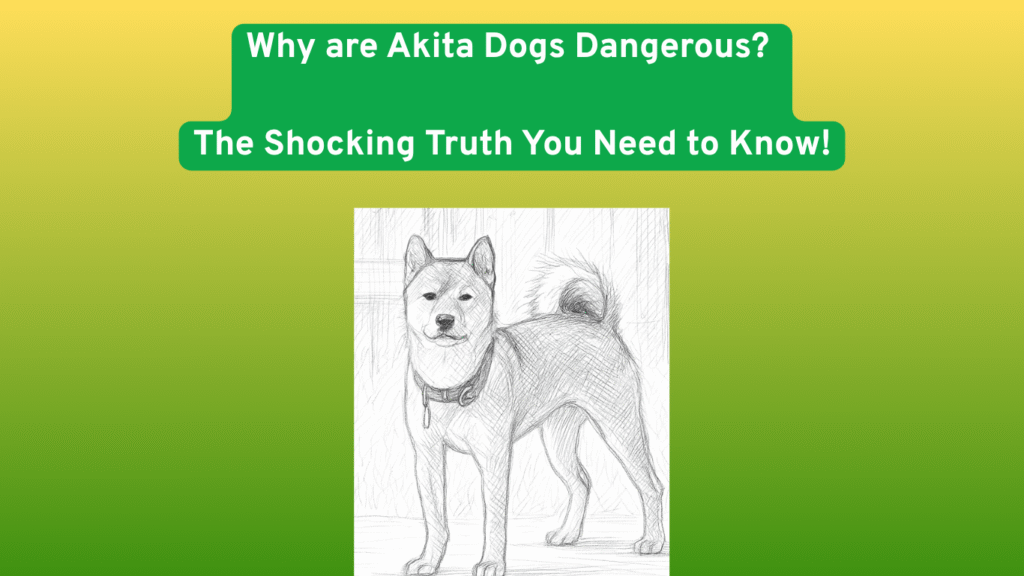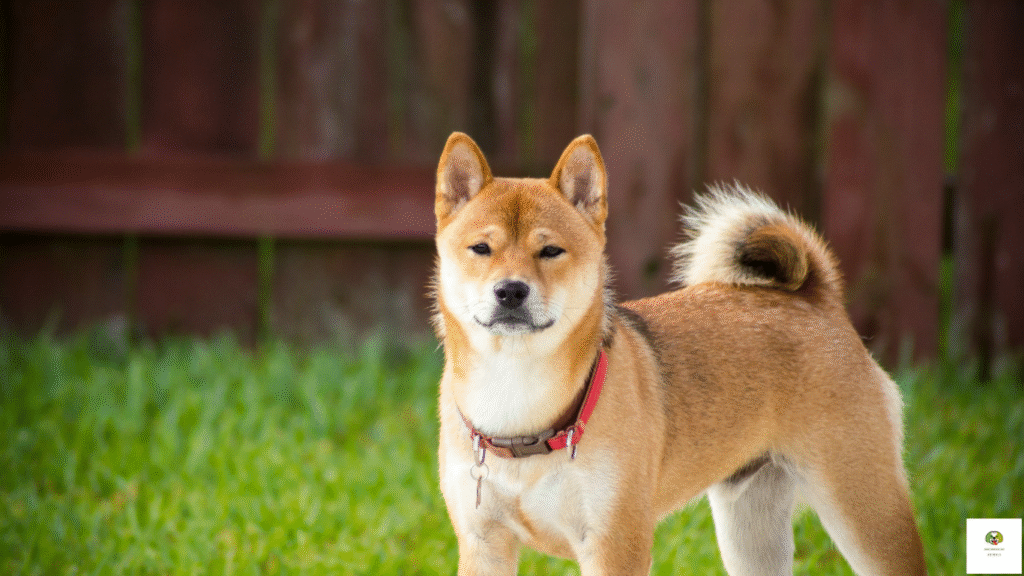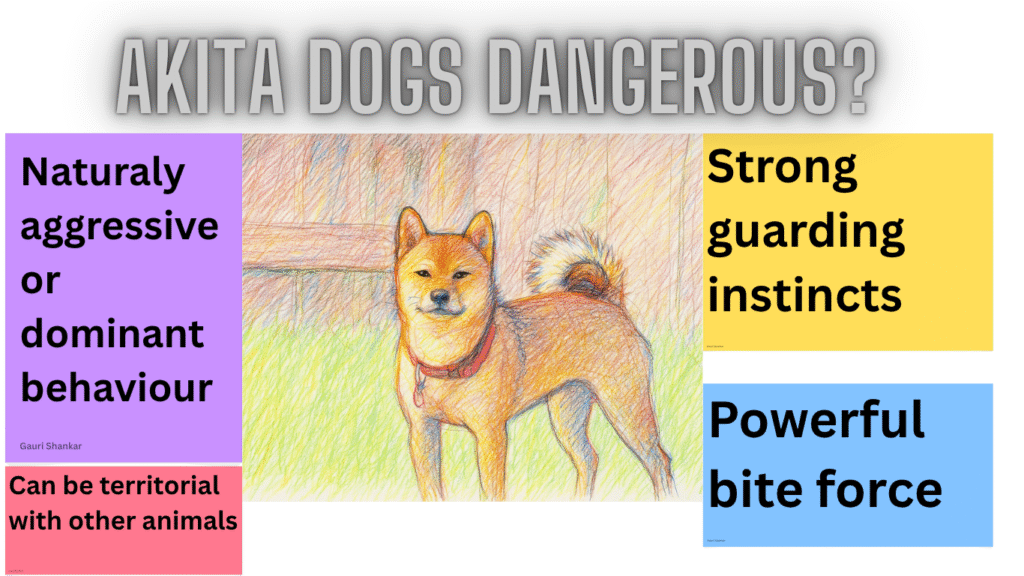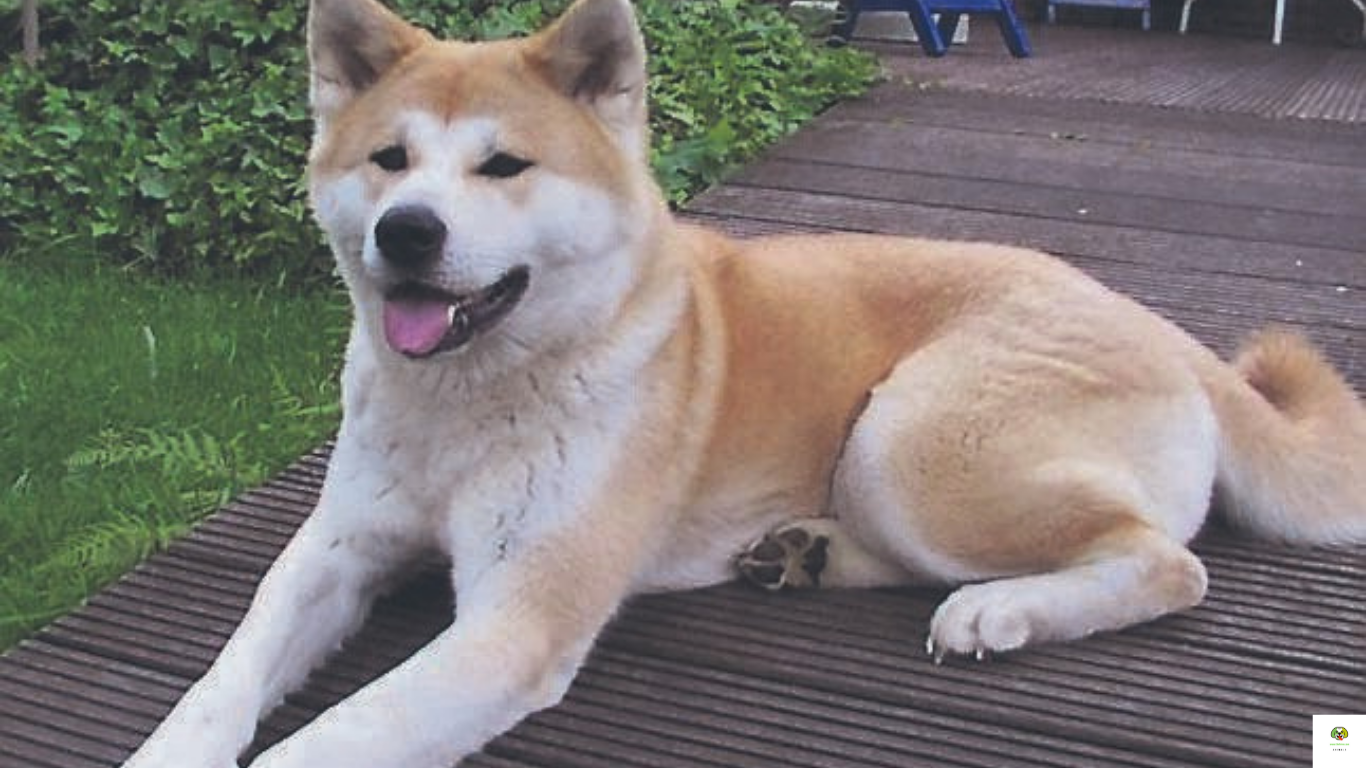Akita dogs are known for their loyalty, strength, and striking appearance, but they also have a reputation for being potentially dangerous. Originally bred in Japan for hunting and guarding, Akitas are powerful, independent, and protective by nature. While they can be loving family pets, their strong instincts and territorial behaviour require careful handling. Without proper training, socialisation, and responsible ownership, Akitas may display aggression toward other animals or even humans. But does that mean they’re inherently dangerous? Let’s uncover the truth behind their temperament and what every potential owner should know before bringing an Akita into their home.
The Akita’s Strong and Dominant Temperament
Akita dogs are known for their loyalty, courage, and striking appearance, but their strong and dominant temperament makes them a challenging breed for inexperienced owners. Originally bred in Japan for hunting and guarding, Akitas have a natural instinct to be independent and assertive.
They are highly intelligent but can be stubborn, requiring a confident and consistent handler to establish leadership. Without proper training and socialization, their dominant nature can lead to aggressive tendencies, especially toward other dogs or strangers.
Unlike more easygoing breeds, Akitas need firm boundaries and early socialization to prevent territorial or protective behaviors from becoming dangerous. Their strong prey drive means they may not be safe around small pets. While they are deeply devoted to their families, their aloofness with outsiders can make them unpredictable. Owners must invest time in obedience training and positive reinforcement to ensure their Akita remains well-behaved.

Despite their challenges, a well-trained Akita can be a loving and majestic companion. However, their dominant personality means they are best suited for experienced dog owners who understand how to manage a powerful, strong-willed breed. Proper care and training are key to unlocking their best qualities while minimizing risks.
Protective Instincts: Loyalty That Can Turn Aggressive
Akita dogs are known for their unwavering loyalty and strong protective instincts, making them excellent family guardians. However, this trait can sometimes lead to aggression if not properly managed. Why are Akita dogs dangerous in certain situations?
The answer lies in their natural instincts—bred as hunting and guard dogs, Akitas are highly alert and territorial. While their devotion to their owners is unmatched, they can perceive strangers or other animals as threats, leading to defensive behaviour. Without early socialisation and consistent training, their protective nature can escalate into aggression.
This doesn’t mean Akitas are inherently vicious, but their strength and independence require responsible ownership. Understanding their temperament, providing proper training, and ensuring they are well-socialised can help prevent dangerous situations. If raised with care, Akitas can be loving and gentle companions, but their powerful instincts mean they aren’t the right fit for inexperienced dog owners. The key lies in respecting their nature while guiding them with firm, positive reinforcement.
High Prey Drive: Why Akitas May Attack Smaller Animals
Akitas are powerful, loyal dogs with a strong hunting instinct rooted in their history as skilled hunters in Japan. Bred to track large game like boars and bears, they possess a natural prey drive—an instinct to chase and potentially attack smaller animals.
While this trait made them excellent working dogs, it can pose risks in homes with small pets like cats, rabbits, or even small dog breeds. Their high prey drive means they may see fast-moving or tiny animals as targets rather than companions.
Unlike some breeds that easily coexist with other pets, Akitas require early socialisation and consistent training to manage this instinct. Without proper guidance, their strong chase reflex can lead to dangerous situations.
Responsible ownership involves understanding this aspect of their temperament and taking precautions, such as supervised interactions or secure outdoor spaces. While Akitas can be gentle with their families, their innate hunting instincts mean they may not always be safe around smaller animals.
Awareness and proactive training are key to preventing accidents and ensuring harmony in multi-pet households.
Territorial Nature: Aggression Towards Strangers & Other Dogs
Akita dogs are known for their strong territorial instincts, which can sometimes lead to aggressive behaviour toward strangers or other animals. Bred originally as guard dogs in Japan, Akitas have a natural tendency to protect their home and family. While this makes them excellent watchdogs, it also means they may perceive unfamiliar people or pets as threats.

Without proper socialisation and training, their protective instincts can escalate into unwanted aggression. Early exposure to different environments, people, and animals is crucial to help them distinguish between real dangers and normal interactions. Owners must establish firm leadership and consistent boundaries to prevent dominant or overly defensive behaviour. Despite their loyalty, Akitas may not be the best fit for first-time dog owners due to their strong-willed nature.
Responsible ownership, including obedience training and controlled socialisation, can help manage their territorial tendencies and ensure they remain well-behaved companions. Understanding their instincts is key to fostering a safe and harmonious relationship with these majestic but powerful dogs.
The Risk of Untrained or Poorly Socialised Akitas
Akita dogs are known for their loyalty, strength, and protective nature, but without proper training and socialisation, they can become unpredictable. Originally bred for hunting and guarding, Akitas have strong instincts that, if not managed early, can lead to aggressive or dominant behaviour.
| Tips | Why it matter |
| Early Socialization | Helps them get used to other animals and people |
| Consistent Training | Teaches them to follow commands and reduces dominant behavior |
| Avoid Rough Play | Prevents triggering aggressive instincts |
| Supervise Around Strangers | Reduces the risk of unexpected attacks |
| Neutering/Spaying | May help reduce territorial aggression |
An untrained Akita may struggle with obedience, react aggressively toward strangers, or even challenge its owner’s authority. Poor socialisation, especially during puppyhood, can make them overly suspicious of new people, animals, or environments, increasing the risk of bites or attacks. Unlike more easygoing breeds, Akitas require consistent leadership and positive reinforcement to learn boundaries.
Without this guidance, their natural independence can become stubborn, making them difficult to control. Responsible ownership—including early training, exposure to different situations, and firm but gentle discipline—is key to raising a well-behaved Akita. If neglected, their powerful build and strong will can pose serious risks, especially in households with children or other pets.
The truth is, Akitas aren’t inherently dangerous, but their potential for danger rises significantly when owners fail to invest time in proper training and socialisation.
Akitas and Children: Are They Safe Together?
Akitas are loyal, intelligent, and protective dogs, but their strong-willed nature requires careful consideration when around children. While many Akitas form gentle bonds with family members, their natural guarding instincts and dominant personality can pose risks if not properly managed.
These dogs are powerful and may react unpredictably to sudden movements or loud noises, common behaviours in young kids. Early socialisation, consistent training, and supervised interactions are crucial to ensuring a safe environment. Teaching children to respect the dog’s space and avoid rough play can prevent misunderstandings.
Every Akita has a unique temperament, so assessing their comfort level around kids is essential. With the right approach, Akitas can coexist peacefully with children, but responsible ownership is key to preventing potential dangers.
Famous Cases of Akita Attacks: Understanding the Risks
Akita dogs are known for their loyalty, strength, and striking appearance, but they also have a reputation for being potentially dangerous if not properly trained and socialised. Originally bred in Japan for hunting and guarding, Akitas have strong protective instincts and a dominant personality.
While they can be loving and devoted companions, their powerful build and assertive nature require an experienced owner who understands their needs. Without proper guidance, Akitas may display aggression toward other animals or even humans, especially if they feel threatened.

Their strong prey drive and territorial behaviour can lead to unpredictable reactions in unfamiliar situations. However, it’s important to note that not all Akitas are aggressive. Responsible ownership, early socialisation, and consistent training play a huge role in shaping their temperament.
How Proper Training Can Reduce Aggression
Akita dogs are known for their loyalty, strength, and protective nature, but without proper training, their strong instincts can sometimes lead to aggressive behaviour. Originally bred as hunting and guard dogs in Japan, Akitas have a natural tendency to be wary of strangers and dominant toward other animals. While this makes them excellent protectors, it also means they require consistent socialisation and obedience training from an early age.
The key to reducing aggression in Akitas lies in responsible ownership—understanding their temperament, setting clear boundaries, and reinforcing positive behaviour. Proper training helps them distinguish between real threats and everyday situations, preventing unnecessary aggression.
With patience, structured guidance, and early socialisation, Akitas can become well-mannered, confident companions. The real danger isn’t the breed itself but the lack of proper training and handling. By investing time in their development, owners can bring out the best in these majestic dogs while keeping their strong instincts in check.
Responsible Ownership: Should You Get an Akita?
Akitas are majestic, loyal, and deeply devoted dogs, but they aren’t the right fit for every household. Known for their strong-willed nature and protective instincts, Akitas require an owner who understands their unique temperament. These dogs are intelligent and independent, which means they need consistent training, early socialisation, and firm yet gentle guidance.
Without proper leadership, their natural dominance can lead to behavioural challenges. While Akitas form strong bonds with their families, they can be aloof or wary around strangers and other animals. Their territorial instincts make them excellent watchdogs, but this also means they may not tolerate unfamiliar pets or unpredictable situations.
Potential owners must be prepared to invest time in socialisation and provide a structured environment. If you’re considering an Akita, ask yourself: Can you commit to their exercise needs, mental stimulation, and lifelong training? Are you comfortable managing a powerful, strong-minded breed? Responsible ownership means recognising whether your lifestyle aligns with an Akita’s needs, ensuring a happy, well-adjusted dog and a harmonious home.
Are Akitas Banned in Some Countries? Legal Restrictions
Akita dogs, known for their loyalty and strength, are sometimes subject to breed-specific legislation (BSL) in certain countries due to their powerful build and protective nature. While not universally banned, some regions classify Akitas as “dangerous dogs,” requiring special permits, mandatory muzzling in public, or even prohibiting ownership altogether.
Countries like the UK, Ireland, and parts of Australia have stricter regulations, often due to concerns over potential aggression if the dog is not properly trained or socialised. However, responsible ownership plays a huge role—well-raised Akitas can be gentle and devoted companions.
Before considering an Akita, always check local laws to ensure compliance with breed restrictions. Understanding these regulations helps promote safe and responsible dog ownership while respecting community safety standards.
Read Other Also
How dogs see the world differently from us
Can dogs travel with you on planes
What is the most popular dog in germany
Top 10 best dog breeds for protection and family 2025
FAQ
Akitas aren’t banned in the USA, but some cities or housing communities may restrict them due to their size, strength, and protective nature. They’re often labelled as “aggressive breeds” alongside Pit Bulls or Rottweilers, even though temperament depends on training and upbringing. Akitas are loyal but can be wary of strangers, so proper socialisation is key. Always check local laws before getting one, as rules vary by location. Responsible ownership helps avoid issues
Akita dogs, known for their strength and loyalty, face breed-specific restrictions in some places. They’re banned or restricted in countries like Ireland and parts of the UK, as well as certain U.S. cities (e.g., Denver, Colorado). Some housing communities or insurers may also have rules against them due to their size and perceived aggression. Always check local laws before owning an Akita to avoid legal issues. These rules aim to promote safety but vary by location.
Akitas are rarely used as police dogs because they are strong-willed and independent, making them harder to train compared to breeds like German Shepherds or Belgian Malinois. However, their loyalty, strength, and protective nature make them excellent guard dogs. Some countries may use them in specialized roles, but they aren’t common in standard police work. Their temperament is better suited for personal protection or companionship rather than following structured commands in law enforcement.
Akitas, like most large dog breeds, sleep around 12 to 14 hours a day, including naps. Puppies and older Akitas may sleep even longer—up to 18 hours—due to their growth and lower energy levels. While they enjoy playtime and exercise, they also love lounging and conserving energy. Their calm, watchful nature means they’re often relaxed indoors. However, daily activity is still important to keep them healthy and prevent boredom.

